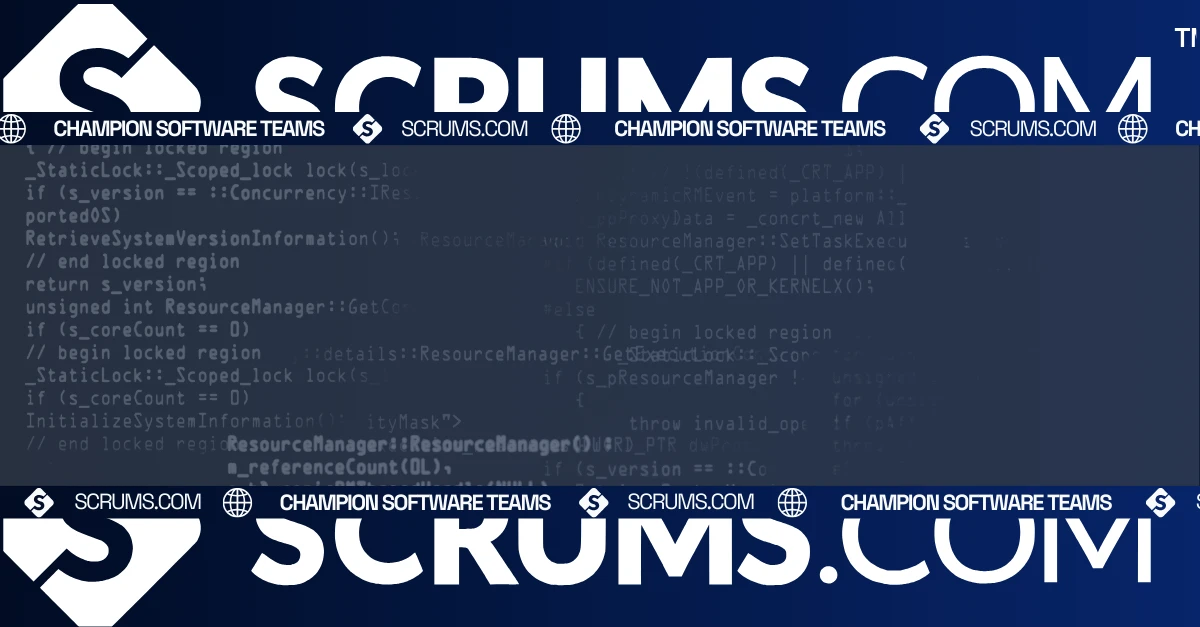Hire HTML software developers
Scrums.com's 10,000+ software developer talent pool includes experts across a wide array of software development languages and technologies giving your business the ability to hire in as little as 21-days.







































Years of Service
Client Renewal Rate
Vetted Developers
Ave. Onboarding
Africa Advantage
Access world-class developers at 40-60% cost savings without compromising quality. Our 8,500+ talent pool across Africa delivers enterprise-grade engineering with timezone overlap for US, UK, and EMEA markets.
AI-Enabled Teams
Every developer works within our AI-powered SEOP ecosystem, delivering 30-40% higher velocity than traditional teams. Our AI Agent Gateway provides automated QA, code reviews, and delivery insights.
Platform-First Delivery
Get real-time development visibility into every sprint through our Software Engineering Orchestration Platform (SEOP). Track velocity, blockers, and delivery health with executive dashboards.
Align
Tell us your needs
Book a free consultation to discuss your project requirements, technical stack, and team culture.
Review
We match talent to your culture
Our team identifies pre-vetted developers who match your technical needs and team culture.
Meet
Interview your developers
Meet your matched developers through video interviews. Assess technical skills and cultural fit.
Kick-Off
Start within 21 days
Developers onboard to SEOP platform and integrate with your tools. Your first sprint begins.
Don't Just Take Our Word for It
Hear from some of our amazing customers who are building with Scrums.com Teams.
Flexible Hiring Options for Every Need
Whether you need to fill developer skill gaps, scale a full development team, or outsource delivery entirely, we have a model that fits.
Augment Your Team
Embed individual developers or small specialist teams into your existing organization. You manage the work, we provide the talent.
Dedicated Team
Get a complete, self-managed team including developers, QA, and project management – all orchestrated through our SEOP platform.
Product Development
From discovery to deployment, we build your entire product. Outcome-focused delivery with design, development, testing, and deployment included.
Access Talent Through The Scrums.com Platform
When you sign-up to Scrums.com, you gain access to our Software Engineering Orchestration Platform (SEOP), the foundation for all talent hiring services.
View developer profiles, CVs, and portfolios in real-time
Activate Staff Augmentation or Dedicated Teams directly through your workspace

Need Software Developers Fast?
Deploy vetted developers in 21 days.
Tell us your needs and we'll match you with the right talent.
What is HTML and Why It Matters for Your Business
HTML (Hypertext Markup Language) is the standard language for creating and structuring web pages. As the foundational technology of the web, HTML works in conjunction with CSS (Cascading Style Sheets) and JavaScript to build the front-end of websites and web applications. According to W3Techs, HTML is used by 99.7% of all websites, making it an essential skill for any web development project.
Hiring an HTML developer is crucial for businesses looking to build or maintain responsive, accessible, and SEO-friendly websites. From creating clean, well-structured code to optimizing web pages for various devices and browsers, HTML developers provide the expertise needed to deliver exceptional user experiences and improve search engine visibility.
Key Benefits of Hiring an HTML Developer
Hiring an HTML developer offers numerous advantages, especially for businesses focused on building user-friendly and optimized websites. Here are some key benefits:
- Responsive Web Design for Better User Experience: HTML developers are skilled in creating responsive web designs that adapt seamlessly to different screen sizes and devices. A well-structured HTML layout, combined with CSS media queries, ensures that your website looks great and functions flawlessly on desktops, tablets, and smartphones.
- Improved Cross-Browser Compatibility: HTML developers ensure that websites perform consistently across different web browsers, such as Chrome, Firefox, Safari, and Edge. This cross-browser compatibility is essential for reaching a wider audience and providing a consistent user experience.
- Enhanced Website Optimization for SEO: An experienced HTML developer understands how to structure content using semantic HTML elements, such as headers, paragraphs, and alt attributes for images. This helps search engines understand the content better, improving your website’s SEO performance.
- Accessibility Compliance: HTML developers are familiar with accessibility standards, such as WCAG (Web Content Accessibility Guidelines). They can create web pages that are accessible to people with disabilities, ensuring compliance with legal requirements and expanding your potential audience.
- Faster Loading Times for Better Performance: Clean and efficient HTML code is crucial for faster loading times, which can significantly impact user engagement and SEO rankings. An HTML developer can optimize your website’s code to minimize load times, resulting in a faster and more responsive user experience.
Core Competencies of a Skilled HTML Developer
When hiring an HTML developer, it’s essential to ensure they possess the necessary skills and expertise to build and optimize modern, responsive web pages. Key competencies include:
- Proficiency in HTML5 and Semantic Markup: A skilled HTML developer should have a deep understanding of HTML5, including new elements and attributes that enhance web page structure and functionality. They should know how to use semantic markup to improve accessibility, SEO, and maintainability.
- Experience with Responsive Web Design: HTML developers should be experienced in creating responsive web designs that provide a consistent experience across all devices. This includes using CSS frameworks like Bootstrap and Tailwind to build mobile-first designs that adapt to various screen sizes.
- Knowledge of Cross-Browser Compatibility and Debugging: A good HTML developer should have experience in ensuring cross-browser compatibility and debugging issues that may arise in different browsers. This includes using tools like BrowserStack and cross-browser testing techniques to ensure consistent functionality.
- Understanding of SEO Best Practices: HTML developers must be aware of SEO best practices, such as proper use of meta tags, structured data, and image optimization. This is crucial for improving search engine visibility and driving organic traffic to your website.
- Familiarity with Accessibility Standards: A competent HTML developer should have experience in implementing accessibility features, such as ARIA (Accessible Rich Internet Applications) roles, keyboard navigation, and screen reader compatibility. This ensures that web pages are accessible to all users, including those with disabilities.
How HTML is Used in Modern Web Development
HTML is the foundation of web development, and its relevance continues to grow with advancements in web technologies. Here are some common applications of HTML in modern web development:
- Building Static and Dynamic Web Pages: HTML is the backbone of both static and dynamic web pages. While static pages rely solely on HTML, CSS, and JavaScript, dynamic pages often use server-side languages like PHP, Python, or Node.js to deliver dynamic content while leveraging HTML for structure and presentation.
- Creating Responsive and Mobile-Friendly Websites: With the increasing use of mobile devices for web browsing, HTML developers focus on creating responsive websites that work seamlessly on smartphones and tablets. HTML5 elements and CSS media queries help build flexible layouts that adjust to various screen sizes.
- Web Accessibility and Inclusivity: HTML is crucial for building accessible websites that comply with WCAG standards. By using semantic HTML elements, alt attributes for images, and ARIA roles, HTML developers ensure that websites are usable by everyone, including people with disabilities.
- Optimizing Websites for SEO: HTML developers play a vital role in optimizing websites for SEO by structuring content using semantic elements, optimizing images, and implementing proper meta tags. This helps search engines crawl and index web pages more effectively.
- Interactive Front-End Development: HTML is combined with CSS and JavaScript to create interactive front-end experiences. This combination allows developers to build engaging websites with animations, forms, and interactive elements that enhance user engagement and retention.
HTML vs. Other Front-End Technologies: When to Choose HTML for Your Project
Choosing the right front-end technology is critical to the success of your web development project. Here’s how HTML compares to other technologies like CSS, JavaScript, and front-end frameworks, and when it might be the best choice:
- Foundation of Web Development: Unlike CSS, which focuses on styling, and JavaScript, which handles interactivity, HTML provides the foundational structure for web pages. Every web project requires HTML as the starting point, making it indispensable for any web development effort.
- Ease of Learning and Implementation: HTML is one of the easiest programming languages to learn and implement. Its simplicity makes it a great choice for businesses looking to build or update websites without a steep learning curve or complex setup.
- Compatibility with All Browsers and Devices: HTML is supported by all web browsers and devices, ensuring universal accessibility. This makes HTML a better choice than some newer technologies that may require additional libraries or plugins for compatibility.
- SEO and Accessibility Benefits: HTML offers inherent benefits for SEO and accessibility. Unlike JavaScript-heavy frameworks that may require additional configuration for SEO, HTML provides a straightforward approach to optimizing content for search engines and users with disabilities.
- Foundation for Modern Web Technologies: While front-end frameworks like React, Vue, or Angular offer more advanced features, HTML remains the foundation of these technologies. A strong understanding of HTML is crucial for developers working with modern web frameworks and libraries.
The Future of HTML Development: Trends and Insights
HTML continues to evolve and maintain its relevance in modern web development. Here are some trends highlighting its ongoing importance:
- Integration with Web Components: HTML is increasingly being integrated with Web Components, which allows developers to create reusable and encapsulated components for modern web applications. This trend is driving demand for HTML developers who can work with custom elements and shadow DOM.
- Focus on Performance and Optimization: As web performance becomes more critical for user experience and SEO, HTML developers are focusing on optimizing web pages for faster load times. Techniques like lazy loading, image optimization, and clean HTML markup are gaining prominence.
- Advancements in HTML5 and Beyond: HTML5 continues to receive updates that improve its capabilities, such as new semantic elements, form controls, and multimedia support. These advancements make HTML more versatile and powerful for modern web development.
- Increased Emphasis on Accessibility: With growing awareness of web accessibility, HTML developers are increasingly focusing on creating websites that comply with WCAG standards. This trend is driving the demand for HTML developers skilled in accessibility best practices.
- Enhanced Tooling and Development Environments: New tools and development environments are making HTML development more efficient and accessible. Tools like Visual Studio Code, Sublime Text, and various browser developer tools are enhancing the capabilities of HTML developers.
How to Hire the Right HTML Developer for Your Needs
Finding the right HTML developer is essential to the success of your web development project. Here’s how to get started:
- Define Your Project Requirements: Clearly outline your project’s scope, technical requirements, and desired features. This will help you identify developers with the right skills and experience.
- Look for Relevant Experience: Choose developers with a proven track record in HTML development, particularly those who have successfully built and optimized responsive and SEO-friendly websites. Experience with accessibility standards and cross-browser compatibility is highly valuable.
- Evaluate Technical Skills: Ensure the developer has strong HTML coding skills, experience with HTML5, and proficiency in building accessible, optimized, and responsive web pages.
- Assess Communication and Collaboration: Effective communication is key to a successful project. Your HTML developer should be able to articulate ideas clearly and collaborate effectively with your team, especially when building complex, interactive web experiences.
- Consider Freelancers or Development Agencies: Depending on the scale of your project, you may opt to hire a freelance developer or work with a development agency specializing in HTML and front-end development. Each option has its advantages, so choose based on your project’s needs and budget.
Find Related Software Developer Technologies
C# Developers
C++ developers
Java Developers
Javascript Developers
Typescript Developers
C developers
Explore Software Development Blogs
The most recent trends and insights to expand your software development knowledge.















